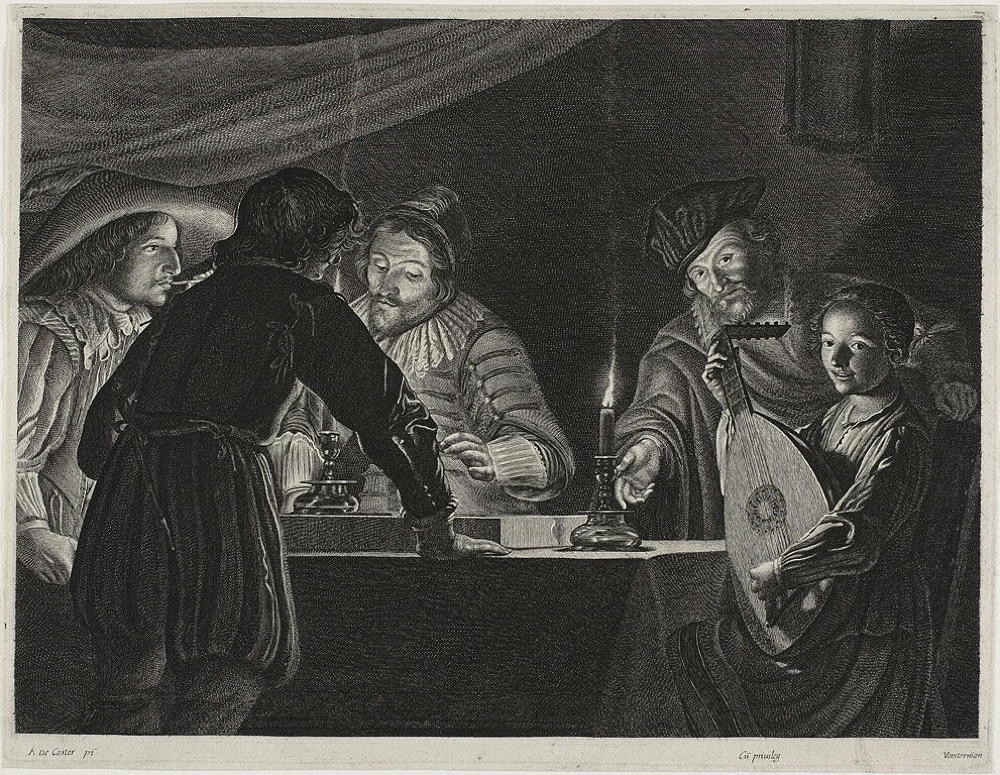SlyenceFriction

Lucas Emil Vorsterman: Backgammon Players (c. 1630)
ABOUT THIS ARTWORK
Adam de Coster was a prominent painter of illuminated night scenes in Antwerp around 1630, about the same time that Lucas Emil Vorsterman was engraving works after his popular contemporaries in the same city. A student of Peter Paul Rubens, Vorsterman employed a style that was originally similar to that of the Flemish master, until a falling out with Rubens and subsequent trip to England provoked him to create stronger, more stylized, Caravaggesque engravings such as Backgammon Players. Clearly influenced by De Coster’s handling of light, Vorsterman brightened the otherwise dark scene with two candles whose flames illuminate the faces of those seated around the table.
"Real life does not even distantly resemble a game of Grand Theft Auto, and probably never will."
A seemingly separate species of human has emerged over recent decades. If this species existed before modern times, they were never terribly influential in human affairs. In scientific circles and among scientific professionals, odd lifestyles doubtless proliferated and were tolerated. Many famous early scientists’ histories read like psychodramas, but they were rarely asked for their opinion on taxation, for instance, or moral questions. Today, nerds seem to have gotten out of hand. Gamers carry a certain reverence in much of the public mind, as if their successes on the Xbox certify them as geniuses or something. Those who take science fiction seriously today enjoy a certain cachet imparted on no ancient. Those who believe we should be colonizing Mars are inexplicably thought to be exceptionally insightful rather than the more traditionally delusional. Something feels unsettling about people who choose to spend their non-refundable time gaming, especially those who consider gaming to be a competitive sport. People who get their jollies blowing away imaginary space aliens might be "on the spectrum" but seem too spacey to ever be senior advisors to a President. So much the worse for anybody who believes science fiction is mere allegory. Many now sincerely believe it's predictive and prescient.
Those who follow false Gods have never before been so involved in politics. They populate some of the most influential positions in our present administration that can't seem to successfully administer anything. Any questions why? Their presence might be a part of the cause of the obvious dysfunction from which we currently suffer. Many cabinet officers seem to adhere to alternate realities, ones more rooted in belief than any observation other than what one sees when plugged into some machine or fiction. Whether Heinlein or Ayn Rand, they mistake fiction for prediction and imagination for prescient projection. They seem to believe a proposed future is more likely to occur than another same-old, same-old one. So far, futures have tended to fall far short of their science fictional representations. Any reasonable reader should be wise to consume those stories with sufficient grains of salt to render them more interesting mental exercises than reasonable expectations. For a portion of those consumers, though, science fiction seems more factual than fictional.
They often explain their obsession as an interest in science, but the science employed in popular science fiction barely qualifies as fiction, let alone science. It's frequently so far removed from any possible future as to prove absolutely misleading. Get a portion of any population pursuing some common objective, though, and that goal gains considerable credibility, if only for the foot traffic around it. For most of us, belief in science fiction seems little removed from an understanding of science, for both seem to take an inordinate amount of brain power. Only those not embarrassed by knowing how a slide rule works need apply. The rest of us easily content ourselves with less eggheaded interests. We'll never learn calculus or understand why anyone would feel moved to even attempt to master it. Science itself seems so mysterious that those who delusionally believe science fiction seems a small enough population as to probably prove to be no real threat to anybody, as they used to be until our current incumbent came along.
Now, he consults cult members for insights and direction. He creates massive fictions without apparently understanding the difference between delusion and observation-based advice. He defunds critically essential research to fund somebody's space travel delusion. He calls respected research phoney science, advised by self-proclaimed scientists who reference their horoscopes each morning before reporting for duty. Those who fervently believe that humankind's only future lies on a planet like Mars, shouldn't be trusted with either public funds or an incumbent's trust. That Silicon Valley executives now apparently buy into the gamer and science fiction believer reality will have a lasting impact on our role in the future of science, for science works like money. Bad science chases out good. Bad scientists cannot produce reasonable results. If our future economies will be focused on buying and selling video games, this SlyenceFriction might prove to be a good thing. Until then, it will remain a malign influence on our collective well-being. Real life does not even distantly resemble a game of Grand Theft Auto, and probably never will.
©2025 by David A. Schmaltz - all rights reserved


